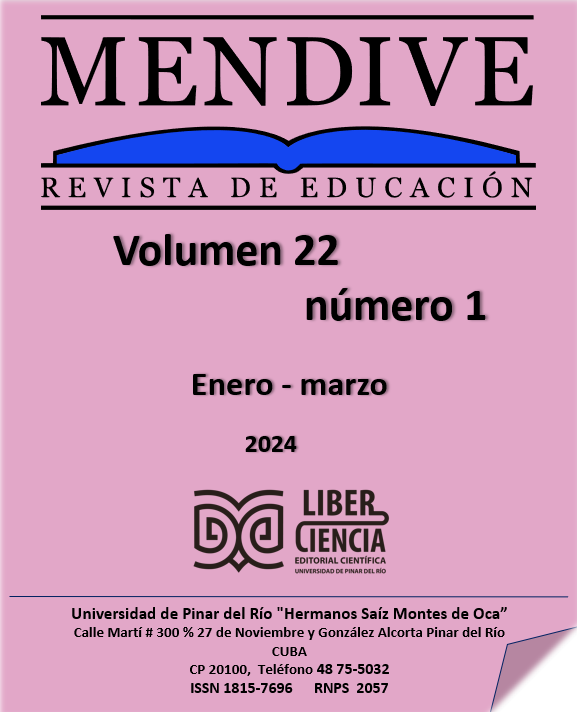English training needs for specific purposes for tourist worker taxi drivers
Main Article Content
Abstract
Education is a complex, continuous and permanent social process that takes place throughout life, and as such, universities in their relationship with society must pay attention to the needs that arise from it, based on collective improvement. The objective of the work was aimed at determining the training needs in English for specific purposes in taxi drivers as tour operators in Riobamba. Based on a mixed methodology, which combines quantitative and qualitative research, in correspondence with the complexity of the object of study. Methods were combined that favor quantitative methodology, which allowed obtaining the necessary information from the selected information sources, through quantitative methods and techniques (questionnaires, interviews, observation, document analysis). The methods cover the entire investigative process, which confer validity and scientificity to the results achieved, the survey to determine the training needs of taxi drivers as tourism operators, interviews to explore the previous experiences of this investigation. As a result, the training needs of taxi drivers as tourism operators were determined and it was evidenced that there is low knowledge of the travel information provided by taxi service personnel, in addition to the fact that there are few training plans imparted from level institutes higher.
Downloads
Article Details

This work is licensed under a Creative Commons Attribution-NonCommercial 4.0 International License.
References
Baralo, M. (2015). El valor del idioma como recurso turístico, económico y cultural. Signos Universitarios, 34(51), pp. 35-61 Revista de la Universidad del Salvador, El Salvador. https://p3.usal.edu.ar/index.php/signos/article/view/3345/4171
Bravo, M., Luzdelia, K., Noda, C., & Victoria, A. (2017). El club de inglés como espacio no formal de articulación universidad-contexto local. Atenas, 2(38), https://www.redalyc.org/journal/4780/478055148009/478055148009.pdf
España, C. (2010). El idioma inglés en el currículo universitario: importancia, retos y alcances. Revista Electrónica Educare, XIV(2), 63-69. https://www.redalyc.org/pdf/1941/194115606005.pdf
García, K., Arenas, R., Enríquez, I., Garbey, E., Valcárcel, N., & Hidalgo, R. (2019). Estrategia didáctica interdisciplinaria para la enseñanza-aprendizaje del Inglés con Fines Específicos en la Licenciatura en Enfermería. Revista Dilemas contemporáneos, VI(2) 1-22. http://www.enfermeria2017.sld.cu/index.php/enfermeria/2017/paper/download/28/3
Hernández, B., Batista, I., Socarrás, S., Ii, S., Bujardón, A. y Iii, M. (2012). Estrategia metodológica para capacitar al tutor de la Vanguardia Mario Muñoz. Una experiencia camagüeyana. Humanidades Médicas, 12(2). http://humanidadesmedicas.sld.cu/index.php/hm/article/view/222
Martínez Molina, O. A., Rodríguez Rensoli, M., & García Felipe, W. (2018). Educación Continua de la UNAE: Un modelo que aporta a la Transformación Educativa del Ecuador. Revista Scientific, 3(8), 159-180. https://doi.org/10.29394/scientific.issn.2542-2987.2018.3.8.8.159-180
Salas Salazar, M. del R., Herrera Chico, M. F., & Luis LLamuca, J. (2022). Análisis variable de calidad, económico de las operadoras de taxi y el impacto del servicio informal, ciudad de Riobamba. Alfa Publicaciones, 4(3), 66-81. https://doi.org/10.33262/ap.v4i3.223
Sánchez Lascano, M., Silva Guerrero, B., & Triviño Burgos, F. (2018). La Educación Continua y los nuevos retos curriculares en el Ecuador. Revista Universidad y Sociedad, 10(4). http://scielo.sld.cu/scielo.php?script=sci_abstract&pid=S2218-36202018000400120
Santana Sardi, G., Vigueras Moreno, J., & Velásquez Ávila, R. (2018). Estudio CTS de un sistema de orientación vocacional profesional virtual para los jóvenes que aspiran ingresar en las carreras universitarias de la universidad técnica de Manabí, Ecuador. Revista de Ciencias Humanísticas y Sociales, 3(3), 55-69. https://revistas.utm.edu.ec/index.php/Rehuso/article/view/1480
Señalin R., Morales, L., Granda J., & Noblecilla R. (2017). La educación superior como base del desarrollo socioeconómico en la ciudad de Machala-Ecuador. Revista Espacios, 38(55). https://www.revistaespacios.com/a17v38n55/a17v38n55p07.pdf
UNESCO. (2016). Educación 2030 Declaración de Incheon. UNESCO. https://unesdoc.unesco.org/ark:/48223/pf0000245656_spa
Yánez M., Saltos M., & Mendoza E. (2019). Inglés como lengua de contacto intercultural y su importancia en la formación del profesional en turismo. Revista Electrónica Formación y Calidad Educativa (REFCalE), 7(1), 245-258. http://refcale.uleam.edu.ec/index.php/refcale/article/view/2981


